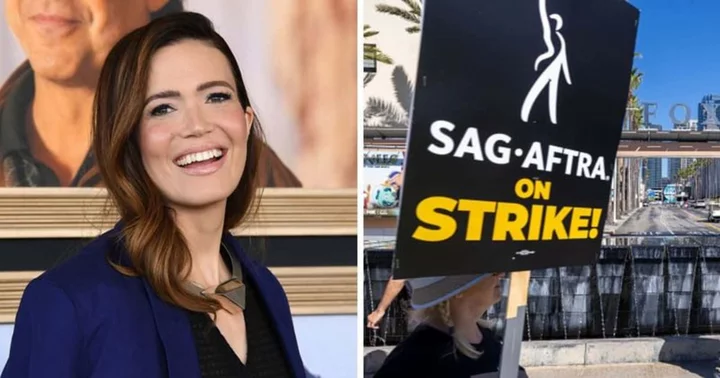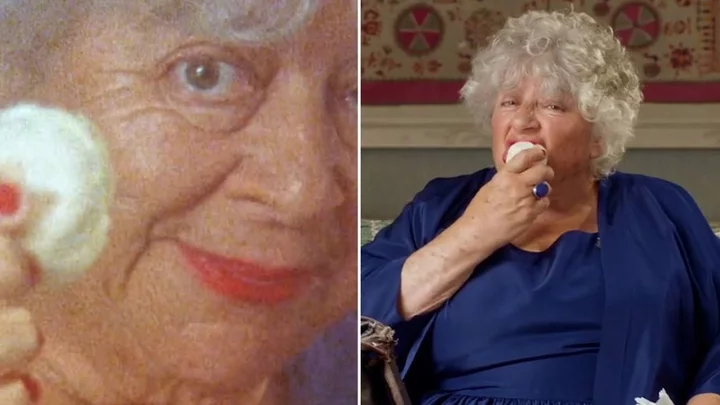LOS ANGELES, CALIFORNIA: Amid the ongoing SAG-AFTRA and WGA strikes, Mandy Moore is the latest celebrity to speak up on the issue of streaming residuals. Moore, who starred in the hit NBC show 'This is Us' which ran for six seasons from 2016 to 2022, is joining the strike to advocate for the strikers.
The singer and actor, who played the character of Rebecca in 'This is Us' for 106 episodes, joined the other striking members of the union in the picket line, revealing that she received streaming residuals as low as one penny to 81 cents, and now she seeks to show her grievances against the executives. Notably, after the show concluded its TV, it landed a lucrative streaming deal with Hulu, and Moore feels that the actors were never fairly paid.
"The residual issue is a huge issue. We’re in incredibly fortunate positions as working actors having been on shows that found tremendous success in one way or another," Moore said in an interview with The Hollywood Reporter. The actress pointed out that several actors depend on the residuals to even "pay their bills," saying, "But many actors in our position for years before us were able to live off of residuals or at least pay their bills." She claimed to have received "very tiny, like 81-cent checks," and added, "I was talking with my business manager who said he’s received a residual for a penny and two pennies." As residuals slowly center stage of the strike, many people are eager to know what is up with them.
What are streaming residuals?
As per the Producer’s Guide, SAG-AFTRA Residual Pay is defined as, "For a TV show, the original compensation covers the first broadcast airing of a show and time on set. Residuals kick in for free television after one airing and a week of AVOD." In the case of broadcast television, the numbers were fairly transparent, which made the payment easier. But with the advent of streaming platforms, the residuals hit the murky waters. Ideally, the residuals can be calculated for certain days after a series goes on air when it comes to streaming platforms, which forms the basis of the contract between the streamers and producers on the one side and the performers and writers on the other.
Notably, there is a segment dedicated to streaming residuals, as per the contract SAG-AFTRA made with Netflix in 2019. While the residual payment structure can vary from streamer to streamer, primarily they are calculated based on the amount the performer originally makes when the show gets commissioned and the number of subscribers the platform has. The percentage rate is highest in the first year and gradually declines till the 13th year, and from there the least percentage rate is applied, as per The Hollywood Reporter.
While the earlier model of residuals still is in practice, in the absence of a clearer and newer agreement between the AMPTP and SAG-AFTRA, the compensations the performers are getting from the streaming services are minuscule. Moreover, one of the basic charges against the streaming platforms is that they do not always give a clear picture of their viewership counts, which hampers calculating the percentage to accuracy.
How are residuals paid for streaming services?
The assistant executive director at the WGA West Charles Slocum explained the system of residual payments by saying, "Over the past decade, while our employers have increased their profits by tens of billions, they have embraced business practices that have slashed our compensation and residuals and undermined our working conditions," to Deadline. Talking about the disparity between the residuals from TV broadcast and streaming devices, Slocum said, "In streaming, the companies have not agreed to pay residuals at the same level as broadcast, or the same reward-for-success as they have traditionally paid in broadcast," before elaborating, "If you write for a streamer, you get two residuals payments – one for domestic streaming and one for foreign streaming. It’s a set amount of money. If it’s a big hit, you do not get paid more residuals in streaming, whereas in the broadcast model, you do because of its success. That’s the sense that residuals were slashed – they have not agreed to a success factor when a program is made for streaming." The writers are thus fighting to get a raise in the "premium" on their residuals, as per the WGA West director.
In the case of the performers, the residuals are paid on the basis of days. As per the SAG-AFTRA website, "On HBO and other pay TV, residuals can occur after 10 exhibition days. With high-budget subscription streaming on platforms like Disney+, performers can begin to earn residual pay after the first 90 days of a program going live." It further says, "In theatrical films, the session fee covers a performer’s work during production plus the theatrical run of that project. Film actors then receive residuals for DVDs, iTunes downloads, and other new media."









